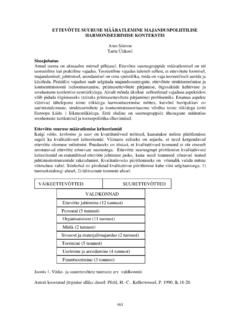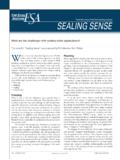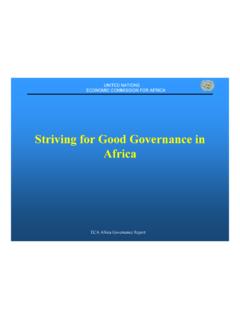Transcription of IMPACT OF GLOBALISATION ON INDUSTRIAL RELATIONS
1 IMPACT OF GLOBALISATION ON INDUSTRIAL RELATIONS . Kaia Philips, Raul Eamets 1. University of Tartu Abstract GLOBALISATION means intensified competition, the transfer of investments, production relocation outside of Europe, job losses, unemployment and rapid structural changes. European labour markets are characterised as relatively rigid, with high social security and strong INDUSTRIAL RELATIONS (IR). The aim of this study is to find out, how the social partners, governments and researchers interpret the challenges of GLOBALISATION on future developments of INDUSTRIAL RELATIONS . The research is based on expert foresight survey where IR experts from 34 countries were interviewed.
2 The project looked to the future, to the year 2025 and discussed on what INDUSTRIAL RELATIONS and social dialogue would look like after fifteen-twenty years. The main findings convinced that decentralisation of collective bargaining is expected in old member states, while the situation will remain unchanged in majority of the new member states. We can conclude that European level convergence is expected in the area of INDUSTRIAL RELATIONS . Keywords: GLOBALISATION , flexibilisation of labour markets, employment security, social cohesion, INDUSTRIAL RELATIONS systems. Introduction Over the past years, Europe has had to deal with strong challenges stemming from GLOBALISATION in the form of intensified competition, the transfer of investments, production relocation outside of Europe, job losses, unemployment and rapid structural changes.
3 High expectations exist related to the competitiveness of the European economy, which means that labour markets will have to become more flexible as employers demand further deregulation of the labour market in order to successfully cope with worldwide competition. At the same time, the European social model underlines the importance of employment security and social cohesion as workers seek greater job security in light of rapid structural change and job relocation. The key issue is how to find a balance between an European social model and the flexibilisation of labour markets while remaining competitive. The importance of modernising INDUSTRIAL RELATIONS has been debated in Europe already since the 1990s.
4 Discussing on modernisation of INDUSTRIAL RELATIONS rises up questions on problems of today and also challenges of future. Today's problems have been analysed in the numerous academic reports. But we have only few studies analysing systematically what are the challenges of the future and what would be 1. We are very grateful to Estonian Science Foundation Grant No. 6479, The Valuation of Human Capital in the Estonian Labour Market: Issues of Over-education and Skill Mismatch , for support. 176. their impacts on INDUSTRIAL RELATIONS . How social partners, governments and researchers see challenges and future development of INDUSTRIAL RELATIONS ?
5 Developments in INDUSTRIAL RELATIONS systems will depend on the processes in environment. For example, pressures of GLOBALISATION affect employment RELATIONS and INDUSTRIAL RELATIONS at regional, national and international levels. These pressures interact with national characteristics: the economic and political system; the type of government; legislative developments; level of economic development; the exposure to GLOBALISATION ; the influence of labour and the state in each country; and different policies regarding INDUSTRIAL RELATIONS . The effect of GLOBALISATION on INDUSTRIAL RELATIONS procedures and their substantive outcomes depends on the conditions under which INDUSTRIAL RELATIONS take place within a country.
6 For instance how quickly will change the structure of industries, what will be the share of informal sector, and so one. It is obvious that the future of INDUSTRIAL RELATIONS systems will depend also on political and economical developments in the countries: which party will be on power; whether there will be shift towards right-wing policies, liberalisation, etc. The aim of this study is to find out, how the social partners, governments and researchers interpret the challenges of GLOBALISATION on future development of INDUSTRIAL RELATIONS . Also we tried to test the hypothesis, whether we can find any evidence of convergence within EU concerning INDUSTRIAL RELATIONS .
7 This paper is based on data collected by authors during European Foundation for the Improvement of Living and Working Conditions project on Impacts of GLOBALISATION on the European social dialogue models . The purpose of the project was to produce INDUSTRIAL RELATIONS foresight 2025 for the EU27 and Global7 2. countries . The basic question of the study was: How INDUSTRIAL RELATIONS look like in the respondents' country in 2025 taking into account the ongoing process of GLOBALISATION ? Output of the project is an analysis on impacts of GLOBALISATION on European INDUSTRIAL RELATIONS in the areas like INDUSTRIAL RELATIONS environment, actors, processes, outcomes and impacts.
8 In this paper we focus mostly to general trends of GLOBALISATION , like working life flexibility, social security, flexible work forms and economic liberalism. Also we look at respondents' opinions about future developments of INDUSTRIAL RELATIONS actors, processes and outcomes. 1. GLOBALISATION and its dimensions GLOBALISATION can be defined as a process of increasing global connectivity, integration and interdependence in the economic, social, technological, cultural, political and institutional spheres. GLOBALISATION refers, for instance, to the processes that reduce barriers between countries and involve greater integration in world markets, thus increasing the pressure for assimilation towards international standards (Macdonald 1997; Frenkel and Peetz 1998; Ali 2005).
9 The economic aspects of GLOBALISATION are the most visible and important ones. These include intensifying economic competition among nations, rapidly expanding international trade and 2. Global 7 countries in this study are Australia, Brazil, China, India, Japan, South Africa and the 177. financial flows and foreign direct investment (FDI) by multinational corporations (MNCs), disseminating advanced management practices and newer forms of work organisation and in some cases sharing of internationally recognised labour standards. GLOBALISATION enhances competitiveness, both at company level and national level, which leads company management and governments to adopt strategies designed to increase labour effectiveness in terms of productivity, quality and/or innovation.
10 In general, GLOBALISATION involves economies that are opening up to international competition and that do not discriminate against international capital. Therefore, GLOBALISATION is often accompanied by a liberalisation of the markets and the privatisation of productive assets. At the same time, GLOBALISATION has obviously contributed to raising unemployment, increasing casual employment and weakening labour movements (Ali 2005). The most important effects of economic GLOBALISATION include the following: x increasing integration of global economic activities, x rising competitiveness, x relocation of economic activities, x structural changes in the economy, x rapid technological advancements and innovation.









